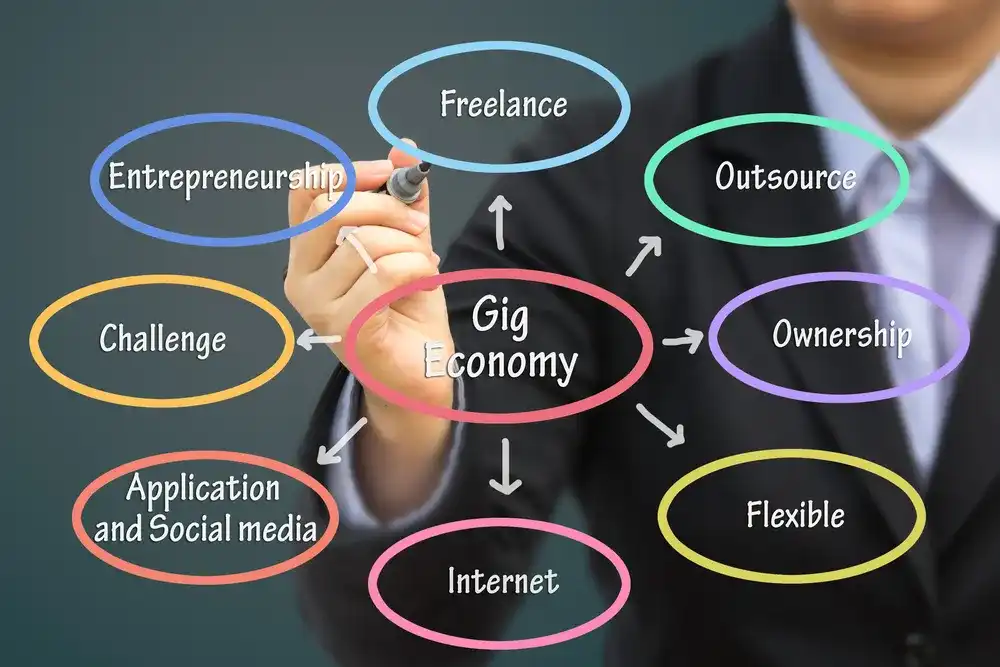Adapting to the Evolution: The Future of Work, Remote Jobs, Gig Economy, and Financial Planning
The world of work is undergoing a remarkable transformation, reshaping the way we earn our living. According to Forbes, in 2023, a surprising 12.7% of full-time employees have embraced the comfort of working from home, while an even more substantial 28.2% have adopted a hybrid work model. This blend allows individuals to balance the convenience of remote work with the benefits of in-office collaboration.
The rapid normalization of these new work dynamics prompts us to explore the significance of adapting financial planning to ensure stability and prosperity in this evolving landscape. Let's take a look at the changing nature of work, remote opportunities, the gig economy, and the crucial role of financial planning in this paradigm shift.
Rise of Remote Work and Its Impact
The COVID-19 pandemic drastically altered the work landscape, halting the routine of heading to the office for many. In March 2020, unless you were a frontline worker, the traditional office routine came to a literal standstill. Even if office attendance was necessary, it became a sporadic affair due to social distancing measures. However, as the pandemic unfolded, some businesses called employees back to the office, sparking discussions and demands for flexibility.
The shift in work dynamics triggered a backlash, with employees now advocating for flexibility, not only for its convenience and reduced commuting costs but also because they've discovered efficient ways of completing their tasks without the perceived inconvenience of a physical workspace. This has led to a surge in remote work trends and a growing demand for remote job opportunities.
The prevalence of remote work spiked during the pandemic, comprising over 50% of full workdays in the U.S. in the spring of 2020. Although it has since decreased, it has stabilized around 28% since early 2023. The advantages of remote work are multifaceted, benefiting both employers and employees:
- Increased Flexibility: One of the greatest benefits of remote work is that it allows employees to manage their time effectively, promoting a healthy work-life balance.
- Reduced Commuting Costs: Employees save on commuting expenses, contributing to financial well-being and reducing the environmental impact.
- Decentralization and Autonomy: The U.S. is well-positioned for remote work, ranking behind only New Zealand and Canada. This is attributed to a high rate of remote work, which aligns with decentralization and personal autonomy. The U.S. has shown superior management practices, enabling effective remote work management. Additionally, larger American residences make it easier to establish dedicated home workspaces.

Gig Economy: Opportunities and Challenges
In tandem with the rise of remote work, the gig economy has witnessed remarkable growth, shaping a landscape where more individuals seek independent work opportunities, be it part-time or full-time. The gig economy, often synonymous with freelance jobs, involves workers pursuing short-term engagements and projects rather than traditional, long-term employment.
A Harvard Business Review article shares more specifically the magnitude of this shift, noting that approximately 150 million people in North America and Western Europe now work as independent contractors, particularly in knowledge-intensive and creative fields.
The gig economy encompasses a diverse array of side hustles, with workers choosing independence despite personal, social, and economic anxieties associated with the absence of traditional employer support.
This growing trend is evident as 36% of U.S. workers are now part of the gig economy, totaling around 57 million people—a substantial leap from 2005 when only 10% were part of this flexible employment model.
Benefits of Freelancing in the Gig Economy
As more individuals gravitate towards the gig economy, embracing the freedom and flexibility it offers, it's essential to delve into the advantages of freelancing to businesses and workers. In this section, we explore the multifaceted benefits that make freelancing an increasingly popular choice in the evolving work landscape.
From cost-effectiveness for businesses to the independence and flexibility cherished by freelancers, let's uncover the positive aspects that define the symbiotic relationship between gig workers and the dynamic market they operate within.
For Businesses
- Cost-Effectiveness: Hiring gig workers can be more economical than maintaining a full-time staff.
- Increased Geographical Labor Force: Businesses can tap into a wider talent pool beyond geographic constraints.
- Increased Production: Flexible gig arrangements can enhance productivity and adaptability.
For Employees
- Independence: Gig workers have the freedom to choose projects and clients.
- Flexibility: The ability to set one's schedule promotes work-life balance.
- Income: Gig workers have the potential to boost their income and earn more based on project volume.
However, gig economy growth is not without its challenges. Gig workers often face uncertainties related to income stability, benefits, and job security. Strategies for financial stability, such as creating an emergency fund and diversifying income sources, become crucial for those navigating the gig landscape.
As gig economy trends continue to evolve, finding a balance between independence and financial security remains a key consideration for both businesses and workers alike.

Financial Planning in a Changing Work Environment
Entering the gig economy or transitioning to remote work demands a fresh perspective on financial planning. For those embarking on gig-based work, meticulous budgeting becomes paramount, especially when considering "ready-to-go" gigs like Uber or DoorDash, where earnings include taxes.
Staying on top of monthly, quarterly, or annual tax obligations is vital to managing finances.
Adjusting Financial Strategies for Remote and Gig-Based Work
As work dynamics continue to evolve, embracing the freedom of remote and gig-based work requires a nuanced approach to financial planning. In this section, we unravel practical insights and strategies tailored to the unique challenges and opportunities of the gig economy and remote job landscape.
From budgeting for fluctuating incomes to busting myths about retirement options, let's explore how individuals can proactively adjust their financial strategies to thrive in the ever-changing world of side hustles from home and modern work.
Budgeting
- Create a detailed budget accounting for fluctuating income.
- Factor in irregular expenses associated with gig work.
- Allocate funds for taxes separately to avoid last-minute surprises.
Savings
- Establish an emergency fund to cover unforeseen expenses.
- Save a percentage of each gig income for long-term goals.
- Prioritize savings for healthcare and insurance needs.
Retirement Planning
- Self-employed individuals can opt for a self-employed 401(k).
- Consider a solo-401(k) for retirement planning, tailored for small-business owners without employees.
- Leverage this retirement option to ensure a secure financial future.
Investment Considerations
- Diversify investments to mitigate risk.
- Explore investment opportunities aligned with your risk tolerance and financial goals.
- Stay informed about market trends to make informed investment decisions.
Navigating the gig economy also dispels the misconception that retirement planning is exclusive to traditional employees. A self-employed 401(k)—also known as a solo-401(k)—offers a tailored retirement savings option for freelancers, sole proprietors, and independent consultants.
This contributes to wealth planning and ensures a disciplined approach to securing your financial future. Adapting financial strategies to the unique demands of remote and gig-based work empowers individuals to thrive in the ever-evolving landscape of the modern workforce.

Balancing Flexibility and Stability
Figuring out the work-life balance in the gig economy can be challenging. Consider that statistics reveal that 30% of those engaging in a side hustle do so out of necessity, seeking extra income to cover basic costs. Notably, 19.1% of side hustlers report earnings surpassing $1,000 per month, dedicating five to ten hours weekly to their additional endeavors, often while juggling a full-time job.
The commitment is even more demanding for small business owners, with 19% working over 60 hours per week. Strikingly, 30% invest 50-59 hours, and 33% dedicate 40-49 hours weekly. In such a landscape, balancing work-life dynamics becomes paramount.
Navigating Financial Stability in Non-Traditional Work Environments
As individuals traverse the unique challenges of non-traditional work arrangements, crafting resilient financial strategies becomes imperative. In this section, we explore practical insights and tips tailored to the dynamic landscape of the gig economy and remote employment, guiding individuals toward financial stability amid the ebb and flow of today's ever-evolving work environment.
From creating safety nets to embracing diversification, let's embark on a journey to fortify financial foundations in the face of non-traditional employment scenarios.
Creating a Safety Net
- Establish an emergency fund to cushion against income fluctuations.
- Plan for income gaps by anticipating slower periods and adjusting spending accordingly.
Managing Finances with the 50/20/30 Methodology
- Allocate 50% of income to necessities, 20% to savings, and 30% to discretionary spending.
- Track expenses diligently to stay within budget and identify areas for potential savings.
Diversifying Income
- Explore multiple income streams to mitigate the impact of fluctuations in any one area.
- Consider part-time gigs, investments, or passive income sources.
Paying Yourself a Salary
- Use separate bank accounts for business and personal finances.
- Allocate a fixed salary from business proceeds to ensure personal financial stability.

Protecting Mental Health and Family Time
As we navigate the delicate balance of remote work stability, recent data shows the prevalence of this shift. Among those with advanced degrees, almost 40% are now engaged in hybrid or fully remote work, highlighting the substantial integration of remote options into the skilled workforce.
Importantly, the data reveals that remote work has not only remained stable over the last year but has, if anything, slightly increased. In this section, we dive into strategies to fortify mental health and preserve cherished family time, recognizing their crucial role in sustaining well-being amidst the stability of remote work environments.
Setting Boundaries
- Establish clear work hours and stick to them to prevent burnout.
- Communicate expectations regarding availability with clients, customers, or employers.
Prioritizing Self-Care
- Incorporate regular breaks and relaxation into the daily routine.
- Seek support from friends, family, or mentorship networks.
Physical Well-being
- Embrace health hacks and prioritize regular physical activity to boost mental health.
- Maintain a balanced diet to sustain energy and overall well-being.
In the ever-shifting landscape of non-traditional work, achieving equilibrium between flexibility and stability is not only a financial imperative but also crucial for safeguarding mental well-being and maintaining meaningful connections with family and loved ones.
Future Projections and Industry Insights
As we peer into future of work trends, the evolving job market and industry shifts offer a fascinating panorama of change and adaptation. Total employment is poised to surge by almost 4.7 million from 2022 to 2032, with the health care and social assistance sector spearheading this growth. This surge reflects the dynamic nature of the workforce, constantly reshaping itself to meet emerging demands.
Recent insights into the future workplace paint a vivid picture. Offices in 2030 are envisioned to revolve around in-person hot desks and hybrid meeting rooms, designed to optimize efficiency in a world increasingly embracing hybrid work models. Added perks, such as free gyms and subsidized cafeterias, aim to attract and retain remote workers. Collaborative ventures may also see companies sharing office spaces with partners or related firms, fostering a sense of community as the remote work trend intensifies.
Total U.S. employment, a key metric in the job market landscape, is projected to climb from 153.5 million to 165.4 million between 2020 and 2030—an increase of 11.9 million jobs, marking a 7.7% uptick. These transformative changes in how and where we work prompt a reevaluation of financial planning strategies.
Impact on the Job Market and Financial Planning
Anticipating changes in the job market and your financial planning is crucial for individuals seeking to navigate the upcoming transformations and proactively align their financial strategies. In this section, we explore the interconnected world of job market impact and financial planning, offering insights to guide individuals toward resilience and success in the face of evolving professional landscapes.
Adaptable Skill Sets
- Cultivate skills aligned with evolving job market demands.
- Embrace ongoing learning and professional development.
Hybrid Work Models
- Recognize the significance of remote and hybrid work in future employment.
- Explore opportunities to capitalize on the flexible work environment.
Collaborative Workspaces
- Consider partnerships or collaborative ventures to share resources and office spaces.
- Evaluate the potential impact on commuting costs and workplace dynamics.
Financial Planning for Industry Shifts
- Anticipate changes in employment sectors and their financial implications.
- Diversify investments to align with emerging industry trends.
These future projections and industry insights underscore the need for adaptability and forward-thinking financial planning to navigate the dynamic terrain of the evolving job market.

Smart Money Moves for the Future of Work
In our journey through the future of work, two big things stand out: handling money in gig jobs and the rise of remote work. These trends show that being flexible with your money plans is super important. Dealing with changing incomes, different job setups, and shifting industries means we need to be ready.
Looking forward, it's key to learn and be ready for new skills and working methods. Making your money plans flexible is the secret sauce. As we enter this new work era, the Cash Store blog is your go-to for more tips on navigating job changes and ensuring your money game stays strong. Keep learning and adapting for a brighter financial future!
The content on this page provides general consumer information or tips. It is not financial advice or guidance. Each person’s circumstances are unique. The Cash Store may update this information periodically. This information may also include links or references to third-party resources or content. We do not endorse the third-party or guarantee the accuracy of this third-party information. There may be other resources that also serve your needs.
More Articles
What to Know About Crypto-Backed Loans
Curious about using your crypto as collateral? Discover how crypto-backed loans work, their benefits, risks, and what to consider before borrowing.
Read More >How Does Installment Loan Approval Work?
Curious about how installment loan approval works? Learn about the key factors lenders consider, the application process, and tips to improve your chances of approval.
Read More >Is it Better to Get an Installment Loan or Line of Credit?
Installment loan or line of credit—which is right for you? Learn the key differences, pros and cons, and how to choose the best option for your financial needs.
Read More >Loan Amount is subject to loan approval. Loan terms and availability may vary by location. Approval rate based on complete applications received across all Cash Store locations. Customers can typically expect to receive loan proceeds in less than 20 minutes; however, processing times may vary. Loans / Advances are provided based on approved credit. Each applicant for credit is evaluated for creditworthiness.
Please see the Licenses and Rates page for additional product details.
Cash Store offers consumer credit products that are generally short-term in nature and not intended for long-term borrowing needs.
In Texas, Cash Store is a Credit Services Organization. Loans are provided by a non-affiliated third-party lender. Please see the Licenses and Rates page for links to Consumer Disclosures and choose the one for the product and amount that most closely relates to your loan request.
Customer Portal residency restrictions apply. Availability of funds may vary by financial institution.

